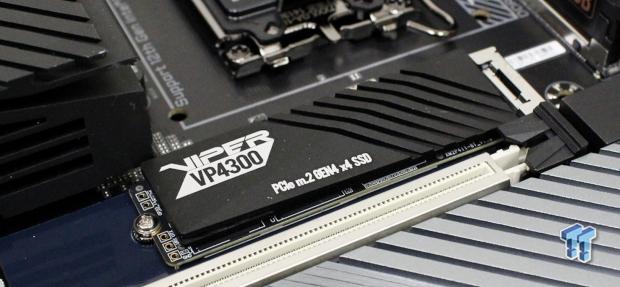
The Bottom Line
Pros
- User Experience
- Optional Heatsink
- Price
Cons
- None
Should you buy it?
AvoidConsiderShortlistBuyIntroduction & Drive Details
There have been a number of "silent upgrades," as we've come to call them, coming from a broad spectrum of SSD retailers. Many SSDs, like the one we've got on the bench today, are now arrayed with Micron B47R 176 Layer flash in place of the Micron 96 Layer flash they were arrayed with at launch. This is a massive upgrade in terms of real-world performance, so we find it interesting that most SSD retailers, for whatever reason, have not announced such a massive upgrade.
We speculate there are likely a few reasons why SSD retailers have not advertised this upgrade. Most of it likely stems from the fact that advertised sequential throughput changes very little, going from 96L to 176L Micron flash. Product managers, like the public in general, tend to wrongly associate throughput with performance. As we've explained ad nauseum over the years, sequential throughput has little to do with consequential performance in the consumer space.
Random read performance at low queue depths is where most real performance comes from; not sequential throughput (the advertised numbers). This is why a Gen3 Optane SSD will beat the crap out of any Gen4 flash-based SSD in terms of real-world performance (including gaming in its current form), even though it is only capable of less than half the throughput of the fastest flash-based Gen 4 SSDs.
Okay, enough speculation as to why most retailers have not announced this now commonplace silent upgrade. The fact is there is no more 96 Layer Micron Flash; it is EOL and not even available to be utilized. So, we believe ANY SSD that came arrayed with 96 Layer Micron at launch and is still being sold without advertised change, exactly like we have here today, will be arrayed for certain with different flash, and most likely that flash will be Micron B47R 176 Layer.
For whatever reason, neither SSD retailers nor most SSD reviewers, in general, have made consumers aware of this hugely positive free performance increase. We believe it is something we want our readers to be fully informed of. So, this is where we are at once again today as we present you with actual numbers to give a proper perspective on what the current iteration of Patriot's Viper VP4300 2TB can do for you.
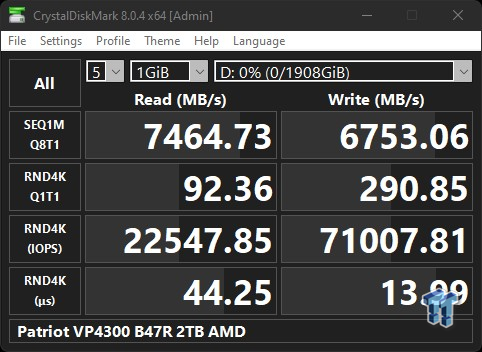
There are some controllers that deliver more maximum sequential throughput on AMD platforms. The InnoGrit IG5236 that adorns the VP4300 is one of them, which is why we include a single CDM benchmark run on our X570 AMD test rig. Advertised up to sequential throughput at 2TB is 7,400/6,800 MB/s. Our sequential throughput results are pretty much spot on, and as we noted previously, sequential throughput has not changed with the flash upgrade.
Drive Details
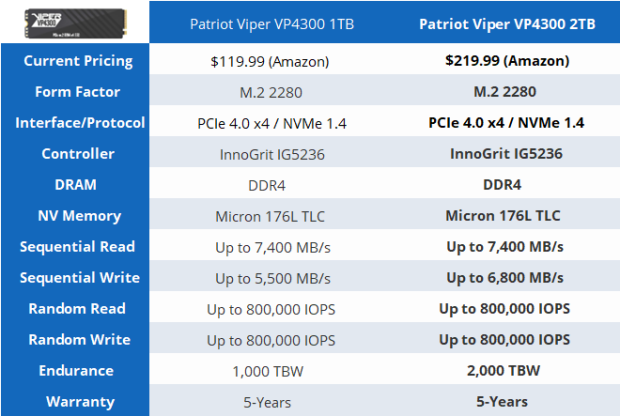
As mentioned, factory specs have not been updated. We will note that the pricing is only half what it was at launch. Current pricing is VERY attractive, especially considering the VP4300 2TB makes the cut as one of the new TweakTown Elite SSDs. 11K doesn't cut it anymore; now, it will take a TT User Experience score of 12K to get there.
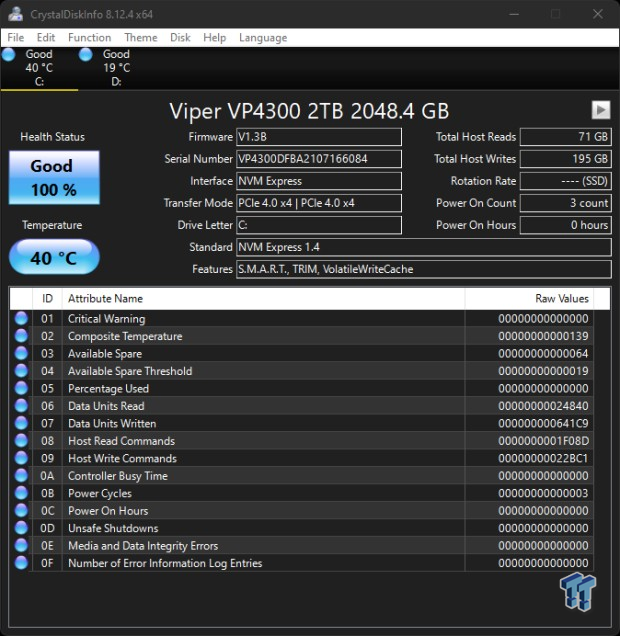
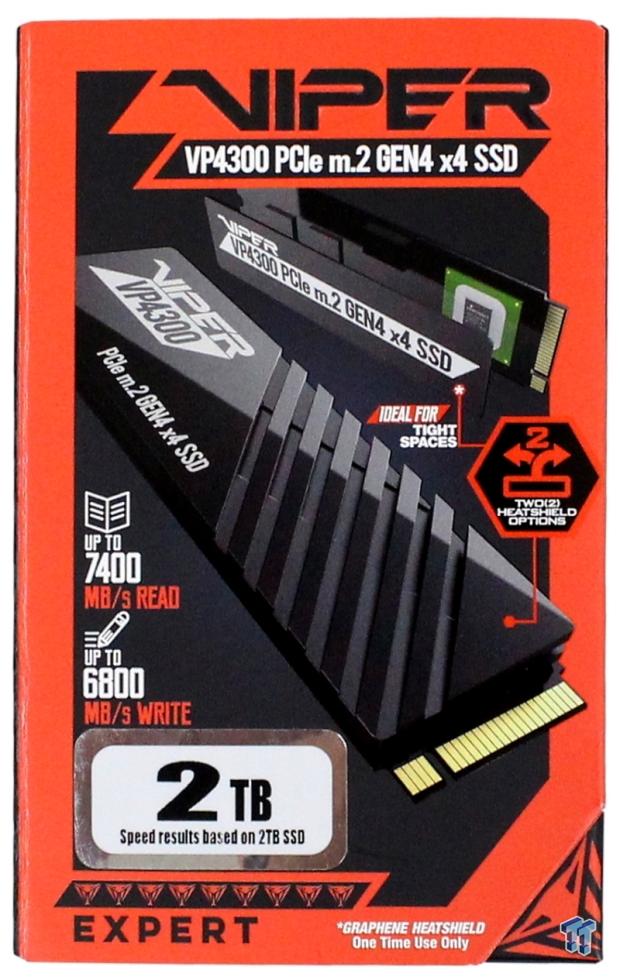
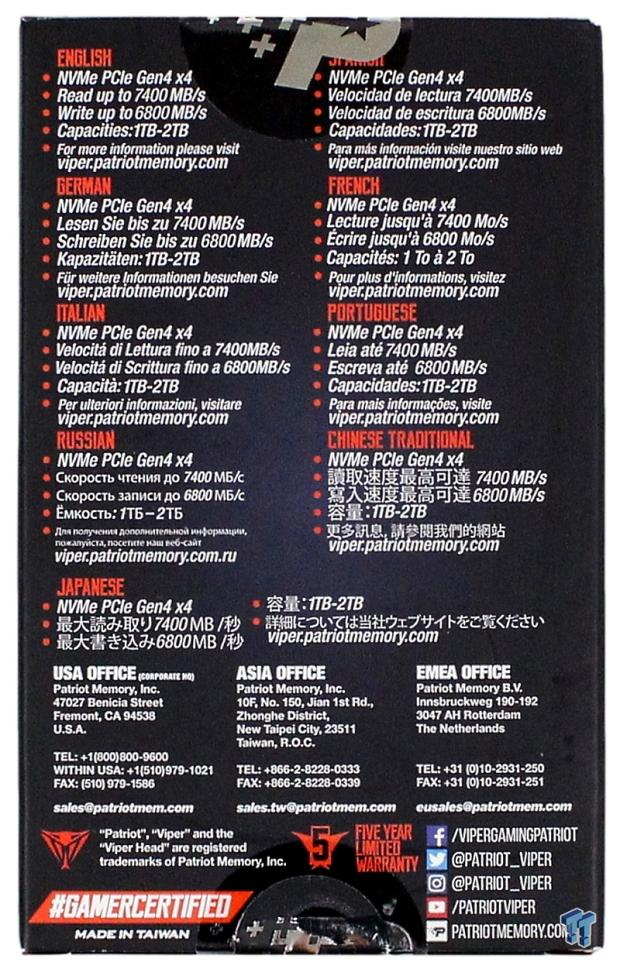


As we mentioned earlier, the packaging is unchanged from how it was launched in April 2021. The drive comes the way we like it, heat sink optional and a heat sink that fits PS5 perfectly.
Jon's Test System Specifications
- Motherboard: ASUS ROG Z690 HERO
- CPU: Intel Core i9-12700K - Buy from Amazon
- Cooler: Alphacool Eissturm Hurricane Copper 45 - Buy from Amazon
- RAM: Sabrent Rocket DDR5 32GB - Buy from Amazon
- Graphics Card: MSI SUPRIM X RTX 3080 12GB - Buy from Amazon
- Case: PrimoChill's Praxis Wetbench - Buy from Amazon
- Power Supply: be quiet! Dark Power Pro 12 1200W - Buy from Amazon
- OS: Microsoft Windows 11 Pro 64-bit - Buy from Amazon

| Today | 7 days ago | 30 days ago | ||
|---|---|---|---|---|
| Loading... | Loading... | |||
|
* Prices last scanned on 12/31/1969 at 6:00 pm CST - prices may not be accurate, click links above for the latest price. We may earn an affiliate commission from any sales.
|
||||
Sony PlayStation 5 - M.2 Storage Expansion
PS5 Read Performance
With Sony's wildly popular PlayStation 5 console now enabled for M.2 NVMe SSDs to be used as fast storage expansion, we include results for PS5 compatible SSDs we test as a part of our reviews going forward. We are utilizing the newest PS5 hardware and software versions.
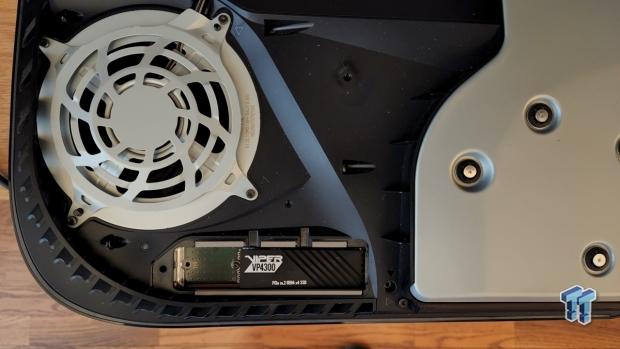
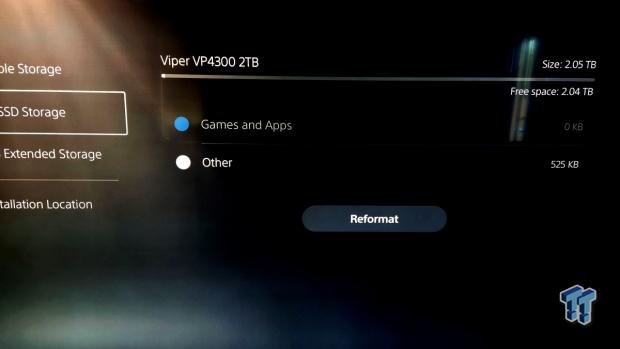
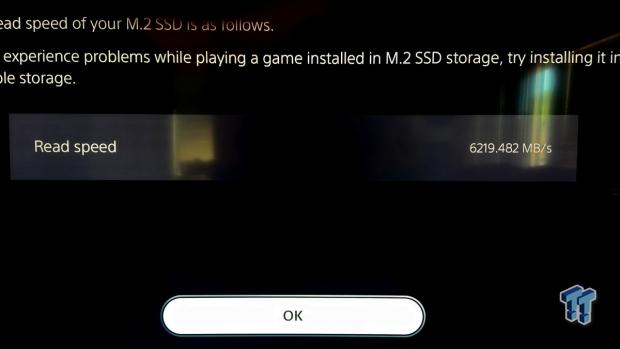
We only chart SSDs that can deliver a minimum of 5,500 MB/s read, which is Sony's original recommendation. We note that with the latest PS5 software update, even SSDs that only do 4,200 MB/s no longer trigger a low-performance warning; nevertheless, we are sticking by Sony's original recommendation of 5,500 MB/s minimum read requirement.
Now even though we didn't see a sequential read throughput increase with the new flash when tested on PC we see quite the nice boost here:
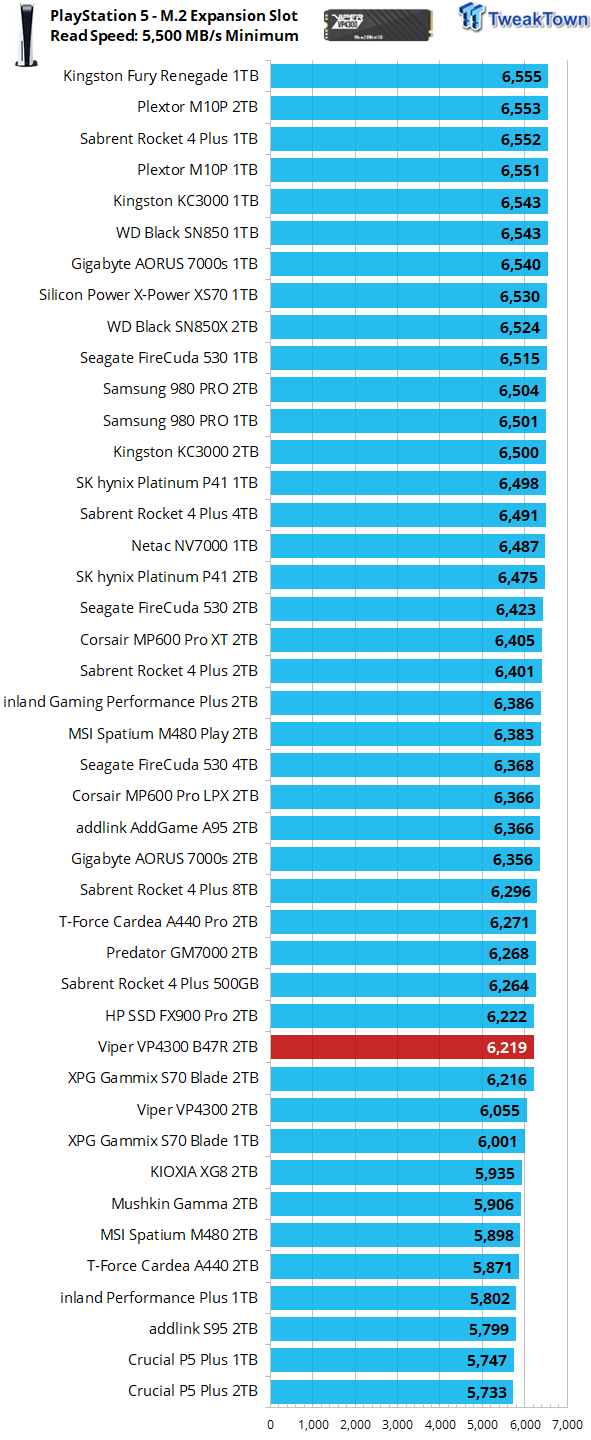
6,219 MB/s is as expected for a 2TB IG5236 controlled SSD arrayed with B47R flash, and it's significantly better than the 6,055 MB/s we get from its launch day configuration.
Synthetic Benchmarks: CDM, Anvil, ATTO
CrystalDiskMark
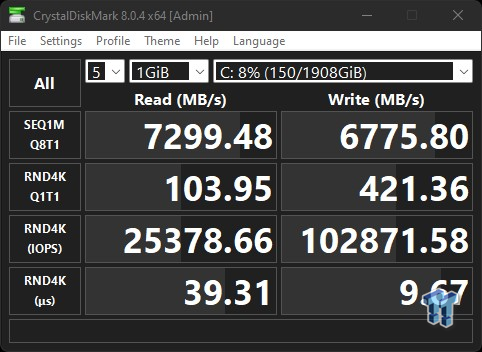
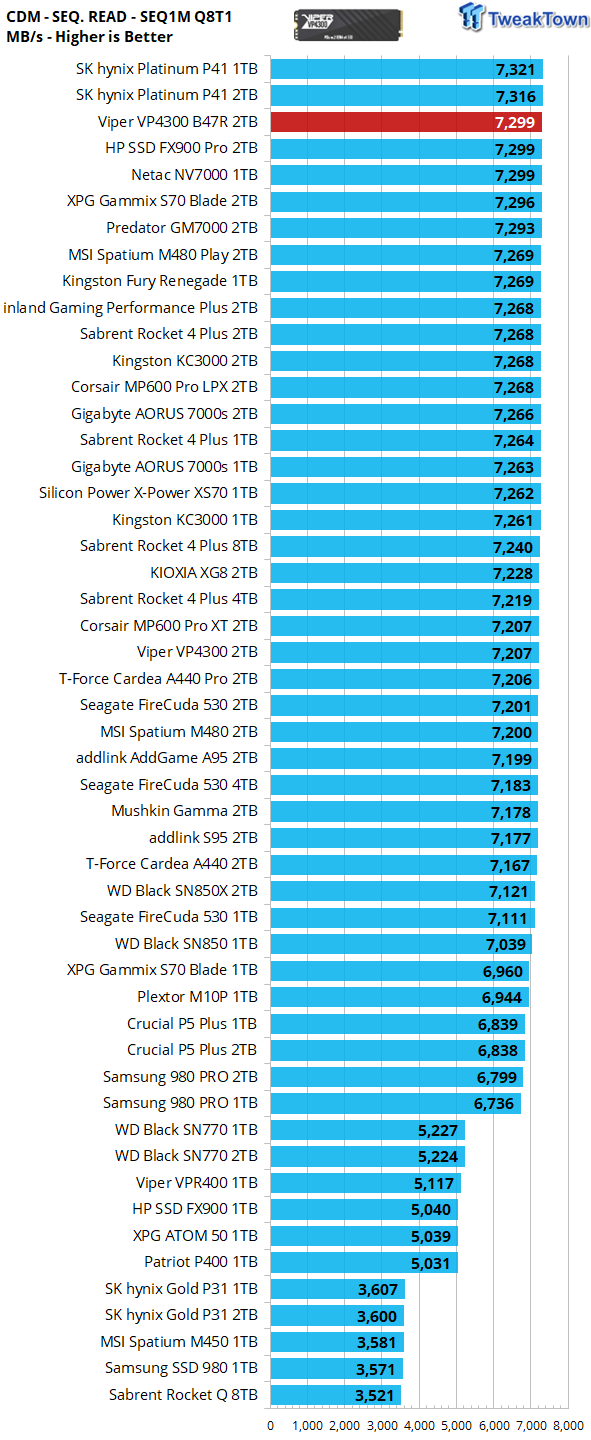
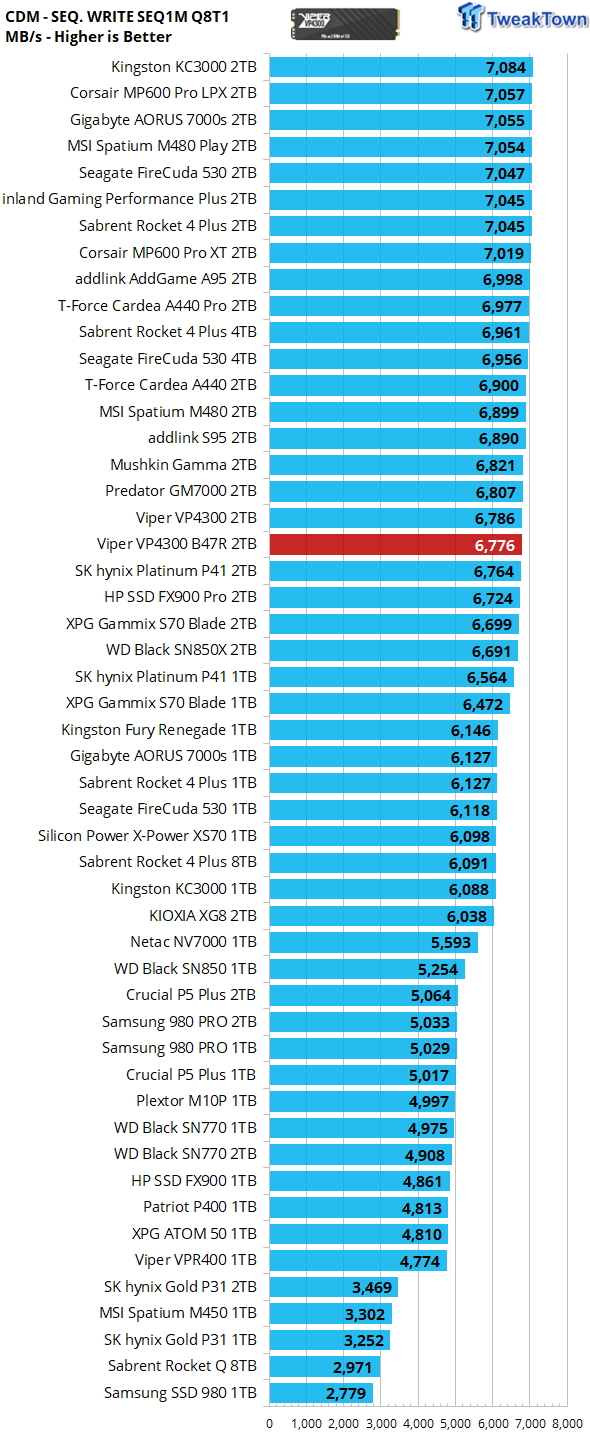
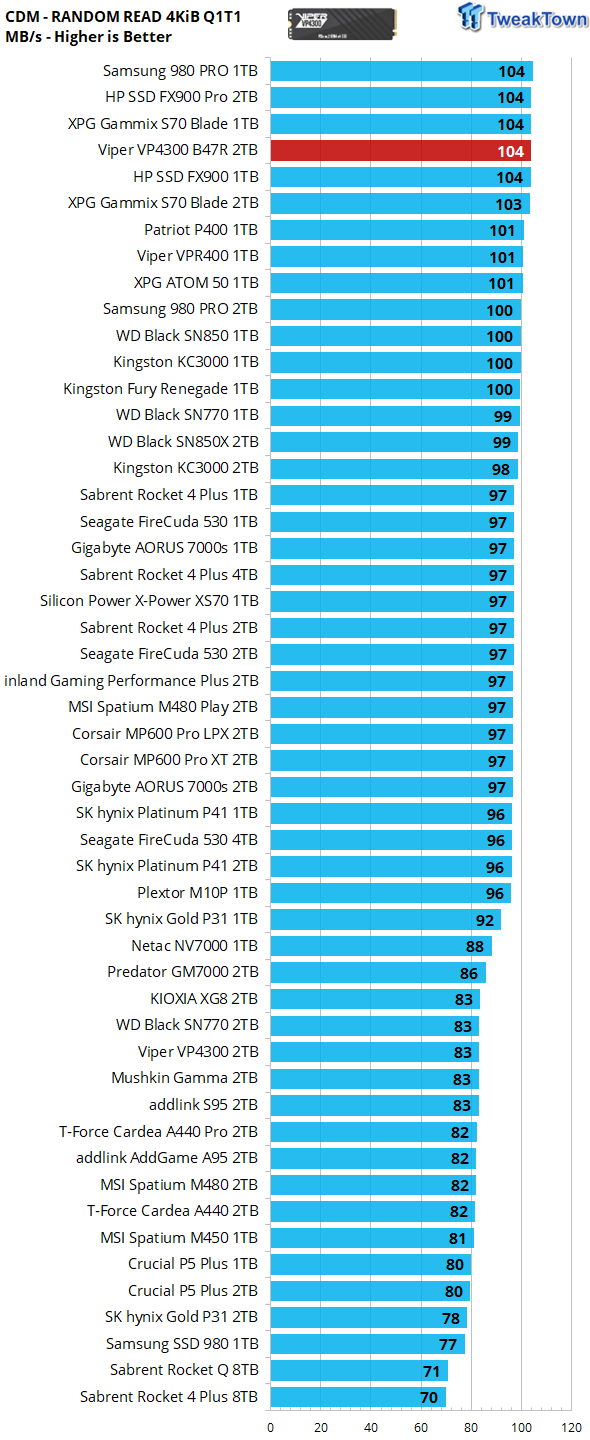
Comparing the launch day configuration to that of the newly arrayed configuration, we find very little change in sequential throughput. However, when we take a look at Q1T1 random read, performance that matters, we find a huge increase of 25% from 83 MB/s to 104 MB/s. This is a very good synthetic indicator that real-world performance will likely be vastly improved.
Anvil's Storage Utilities
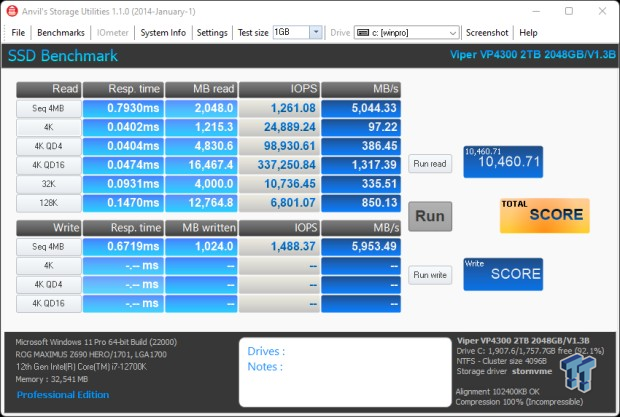
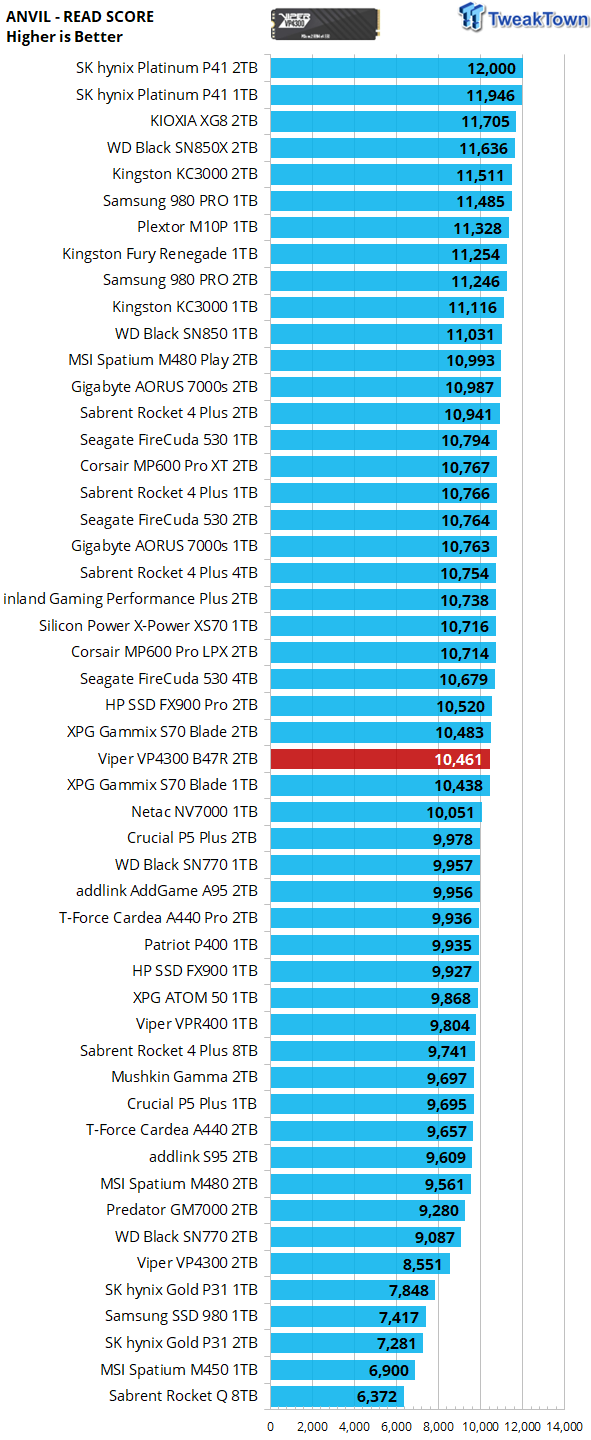
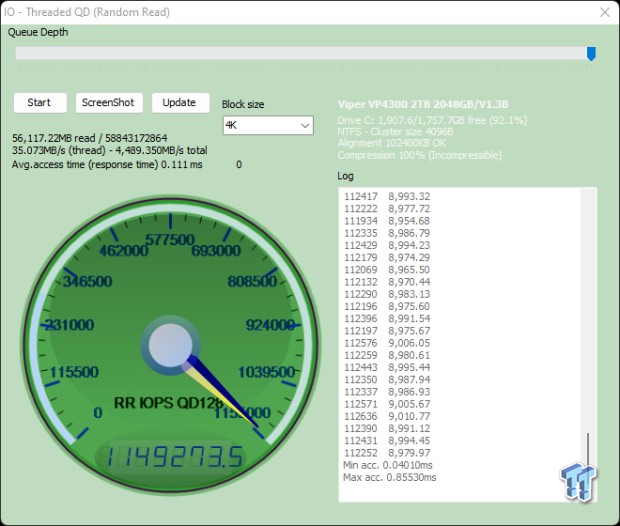
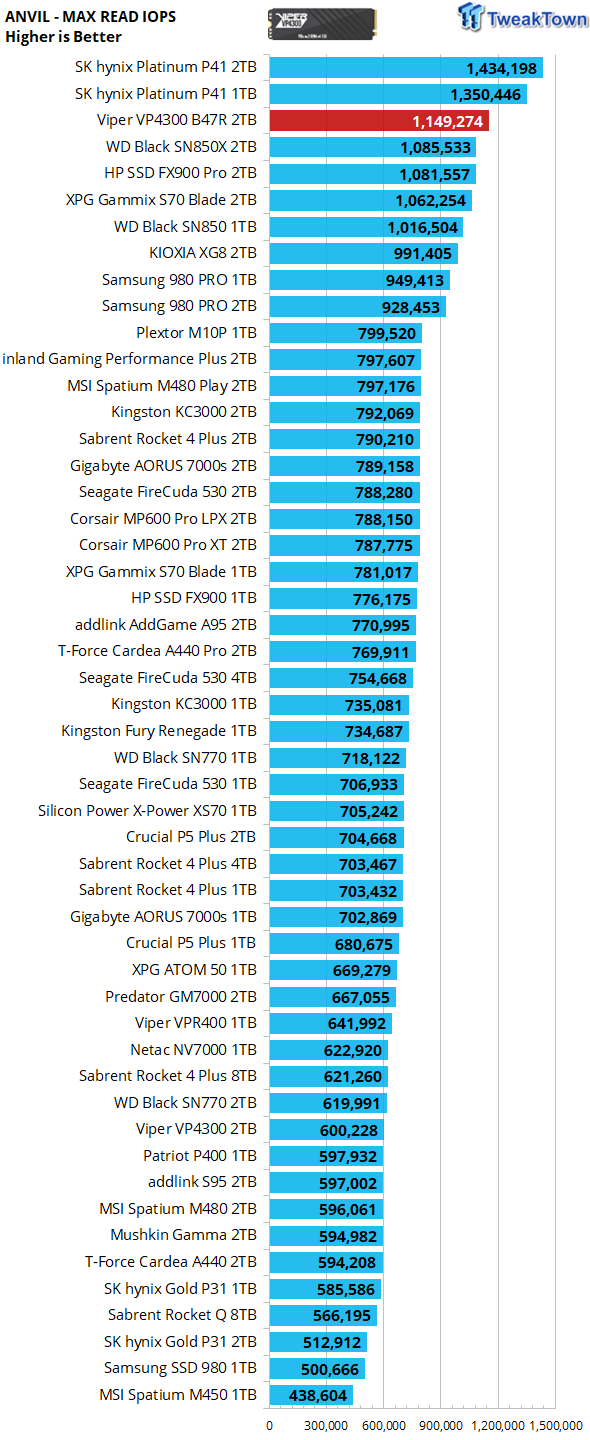
B47R flash vaults the VP4300 2TB from the bottom of the barrel to a respectable slot at the middle of our chart, a 20% scoring increase. Impressive. Additionally, max random read throughput sees a roughly 550K increase. 1.149 million IOPS is the third best we've ever seen from any flash-based consumer SSD. Amazing.
ATTO
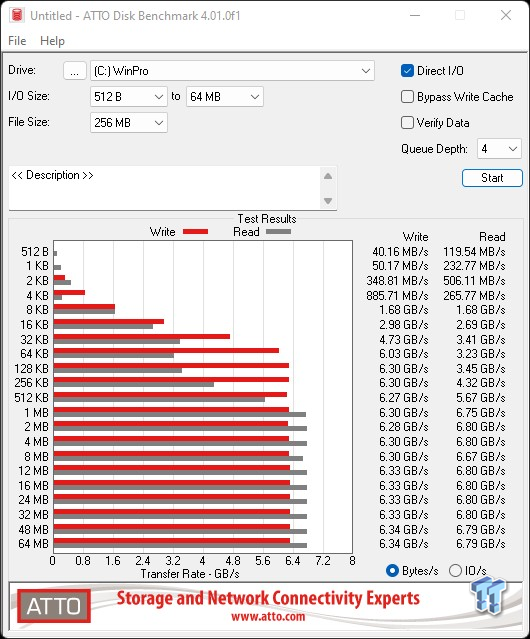
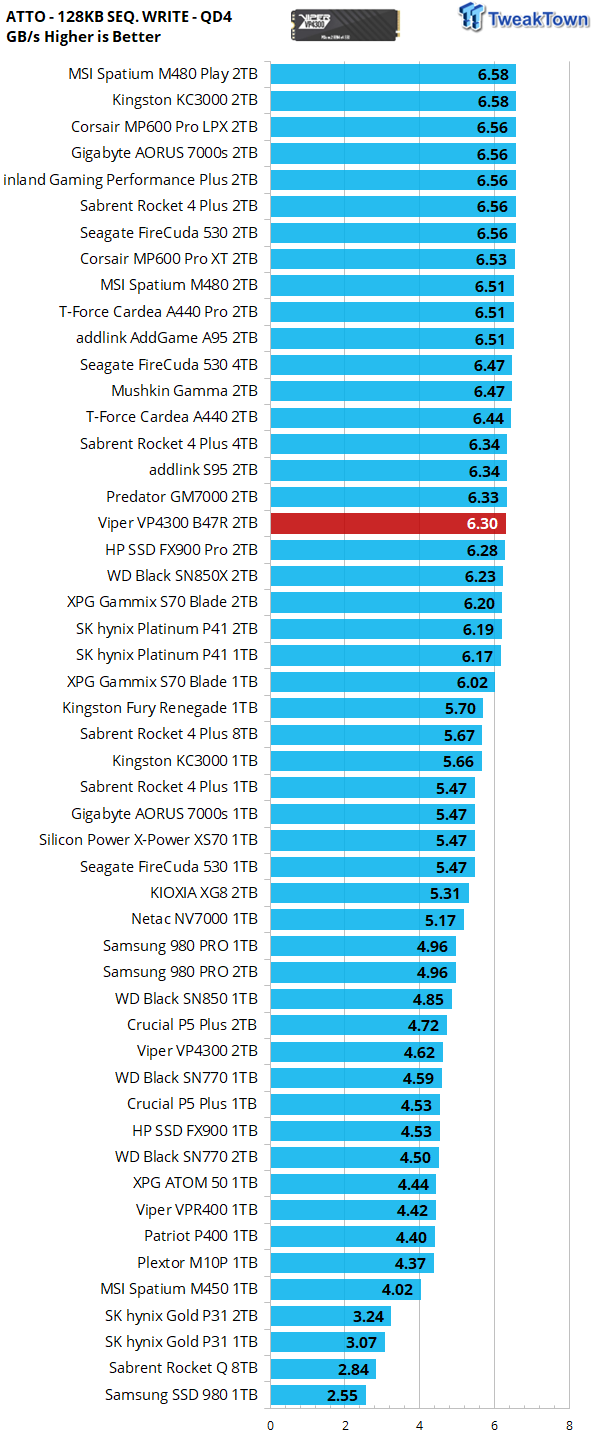
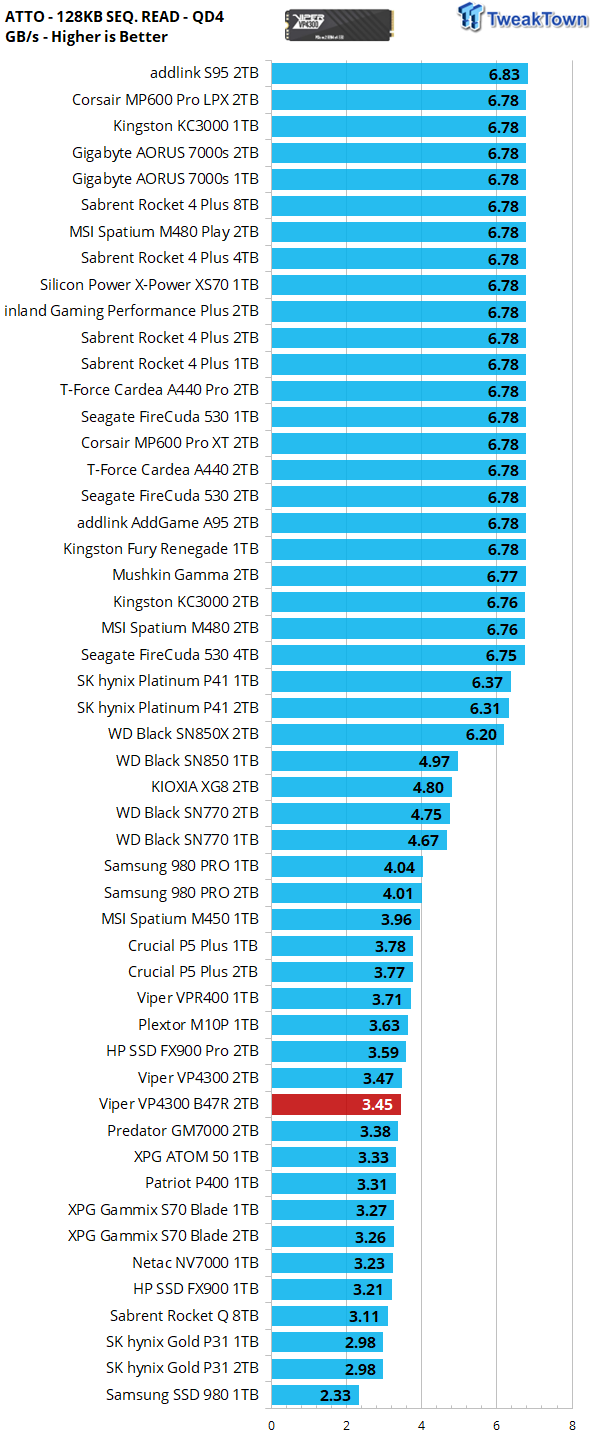
As we've explained many times, sequential performance really isn't performance that matters all that much. This is why the results here don't accurately portray just how much more powerful the VP4300 has become in its current form.
Real-World Testing: Transfers, 3DMark SSD Gaming Test, PCM10 Storage
Transfer Rates
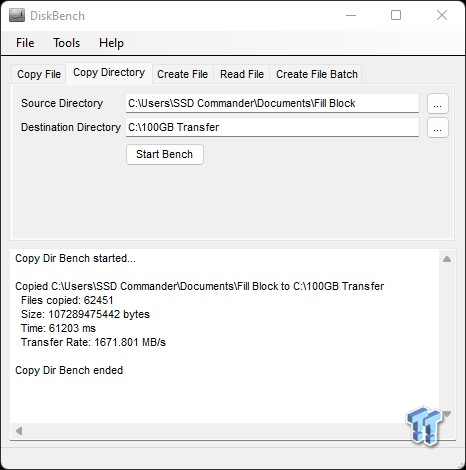
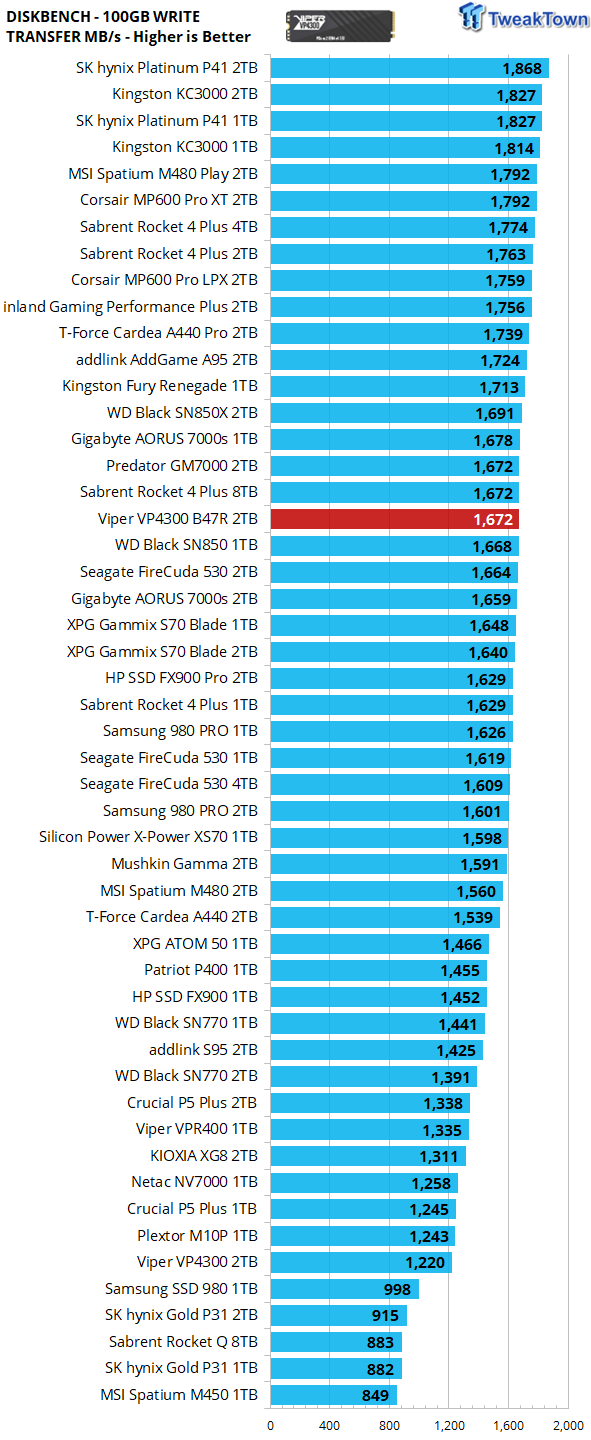
Our 100GB data transfer test is not your ordinary 100GB of data. Ours is a crushing mix composed of more than 62K files. 450 MB/s improvement over its launch day configuration, quite significant at 37%.
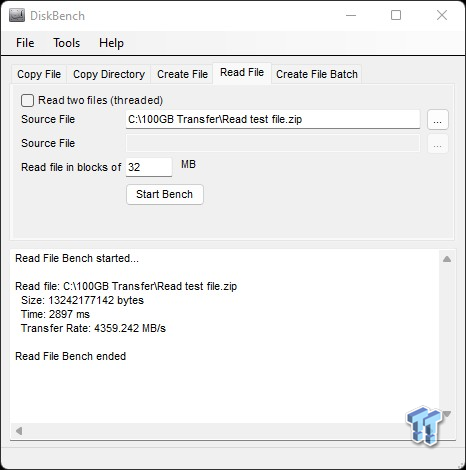
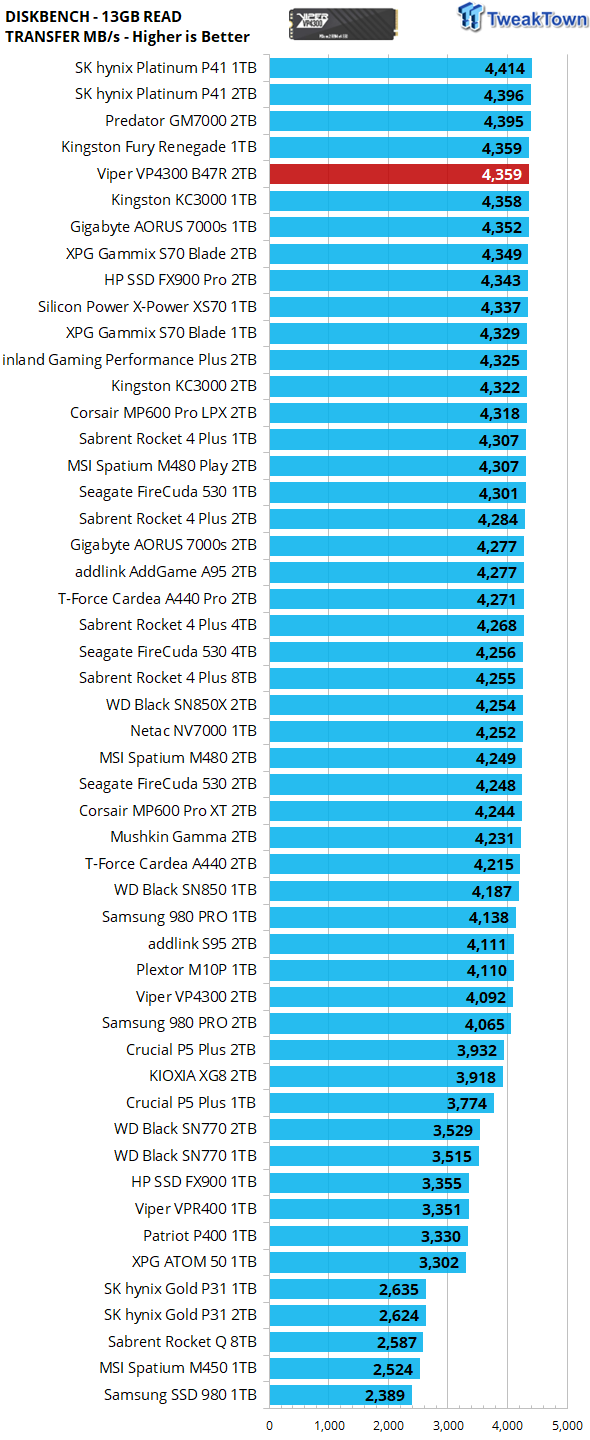
Serving data to the host (read) is performance that matters, and the silently upgraded VP4300 2TB delivers impressively here as well. In fact, it ties for the third best ever. Here again, the new flash vaults the VP4300 from the bottom of our chart to the top.
3DMark SSD Gaming Test
UL's newest 3DMark SSD Gaming Test is the most comprehensive SSD gaming test ever devised. We consider it superior to testing against games themselves because, as a trace, it is much more consistent than variations that will occur between runs on the actual game itself. This test is in fact the same as running the actual game, just without the inconsistencies inherent to application testing.
In short, we believe that this is the world's best way to test an SSDs gaming prowess and accurately compare it against competing SSDs. The 3DMark SSD Gaming Test measures and scores the following:
- Loading Battlefield V from launch to the main menu.
- Loading Call of Duty Black Ops 4 from launch to the main menu.
- Loading Overwatch from launch to the main menu.
- Recording a 1080p gameplay video at 60 FPS with OBS (Open Broadcaster Software) while playing Overwatch.
- Installing The Outer Worlds from the Epic Games Launcher.
- Saving game progress in The Outer Worlds.
- Copying the Steam folder for Counter-Strike Global Offensive from an external SSD to the system drive.
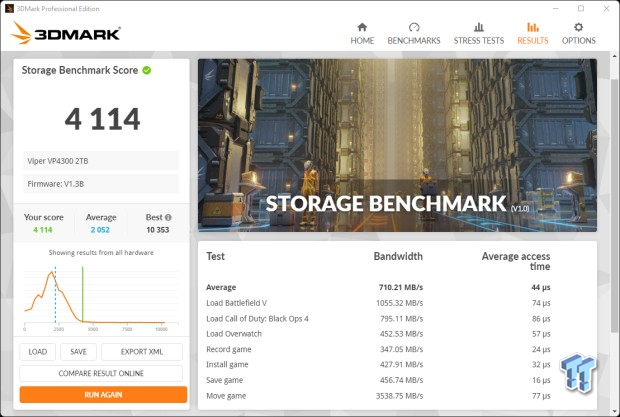
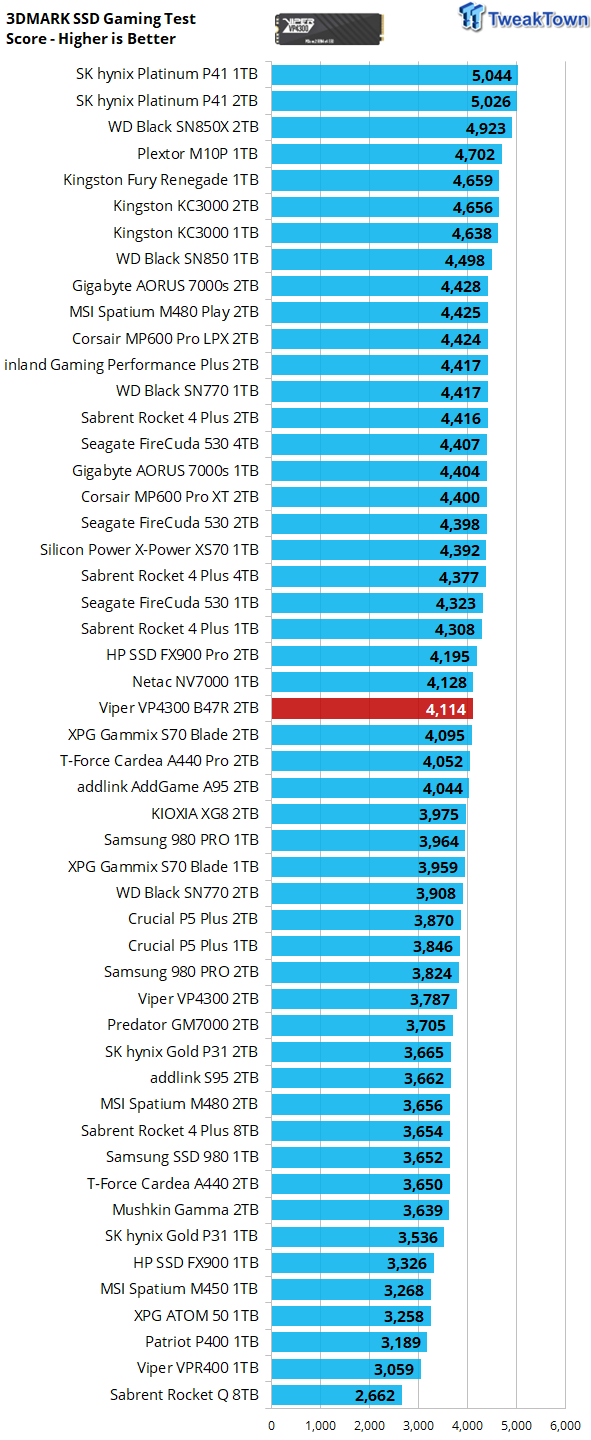
Gaming is a performance metric that matters to the majority of DIY consumers, especially to the enthusiast crowd that TweakTown caters to. Now this should grab your attention if you are a gaming enthusiast. The silently upgraded VP4300 2TB can deliver an overall gaming user experience that 9% better than it did at launch. Somewhat better than a 980 Pro is a good place for any SSD to be.
PCM10 Storage Tests
PCMark 10 Storage Test is the most advanced and most accurate real-world consumer storage test ever made. There are four different tests you can choose from; we run two of them.
The Full System Drive Benchmark and the Quick System Drive Benchmark. The Full System Drive Benchmark writes 204 GB of data over the duration of the test. The Quick System Drive Benchmark writes 23 GB of data over the duration of the test. These tests directly correlate with mainstream user experience.
PCMark 10 Full System Drive Benchmark
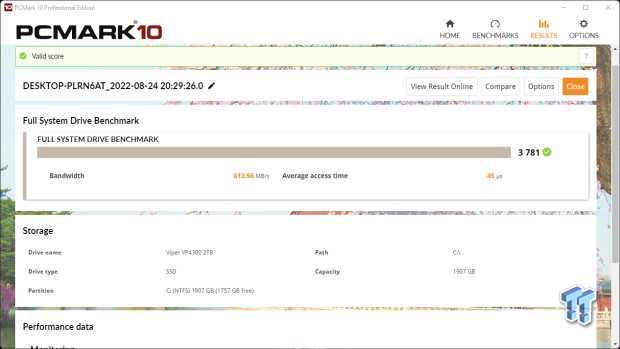
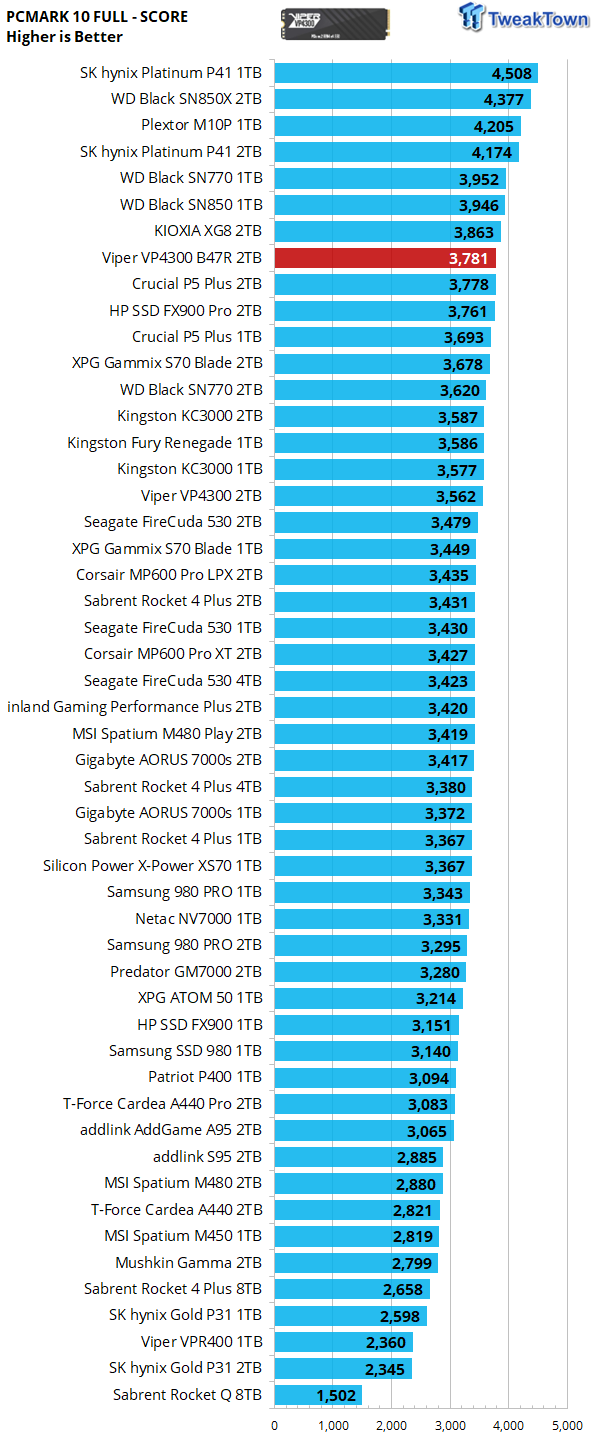
This particular test writes 204GB data and covers a broad range of common consumer tasks, including booting Windows 10, file transfers, Adobe and Office applications, and startup times for games, including Battlefield V, COD Black Ops 4, and Overwatch. Unlike synthetic numbers, this is comprehensive real-world data which is why we use it to rank SSDs in terms of user experience.
IG5236 controlled SSDs all perform consumer workload tasks at among the highest levels in the consumer realm. This is why we are huge fans of the controller. The VP4300 2TB impresses mightily here by delivering the best we've seen from an IG5236 controlled SSD arrayed with B47R flash.
PCMark 10 Quick System Drive Benchmark
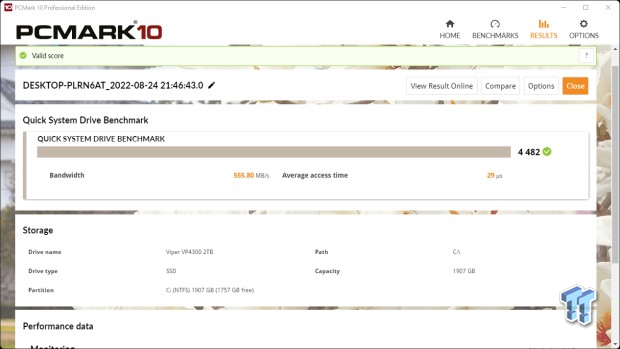
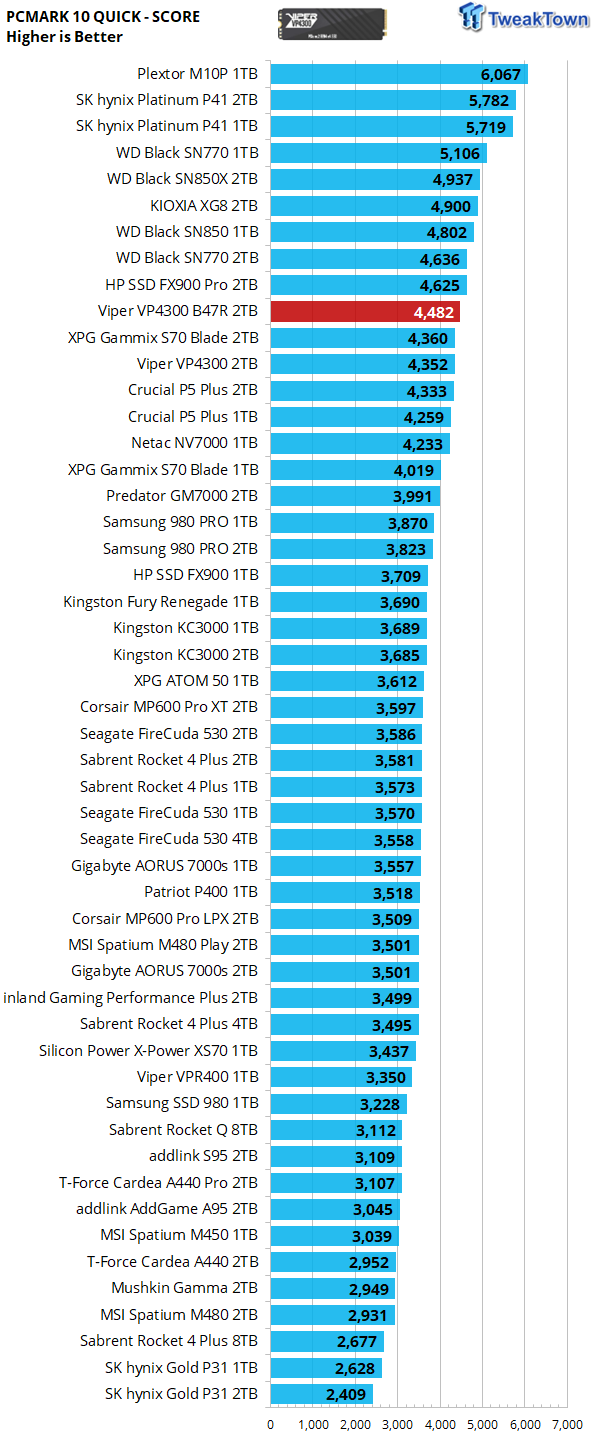
Even in its original configuration, the VP4300 did VERY well here, so even a small increase here is more impressive than the actual numbers would indicate. The runaway leader here is another IG5236-controlled SSD, but it's arrayed with BiCS flash, which is even better than B47R.
Final Thoughts
Well, these silent upgrades are silent no more. Patriot's Viper VP4300 2TB has always been a top performer, but now it's significantly better than when it launched and all of it unannounced. Additionally, the VP4300 has gone from a fairly expensive SSD to one of the very best bargains available while at the same time becoming a better performer. Cheaper and faster - gotta love that.
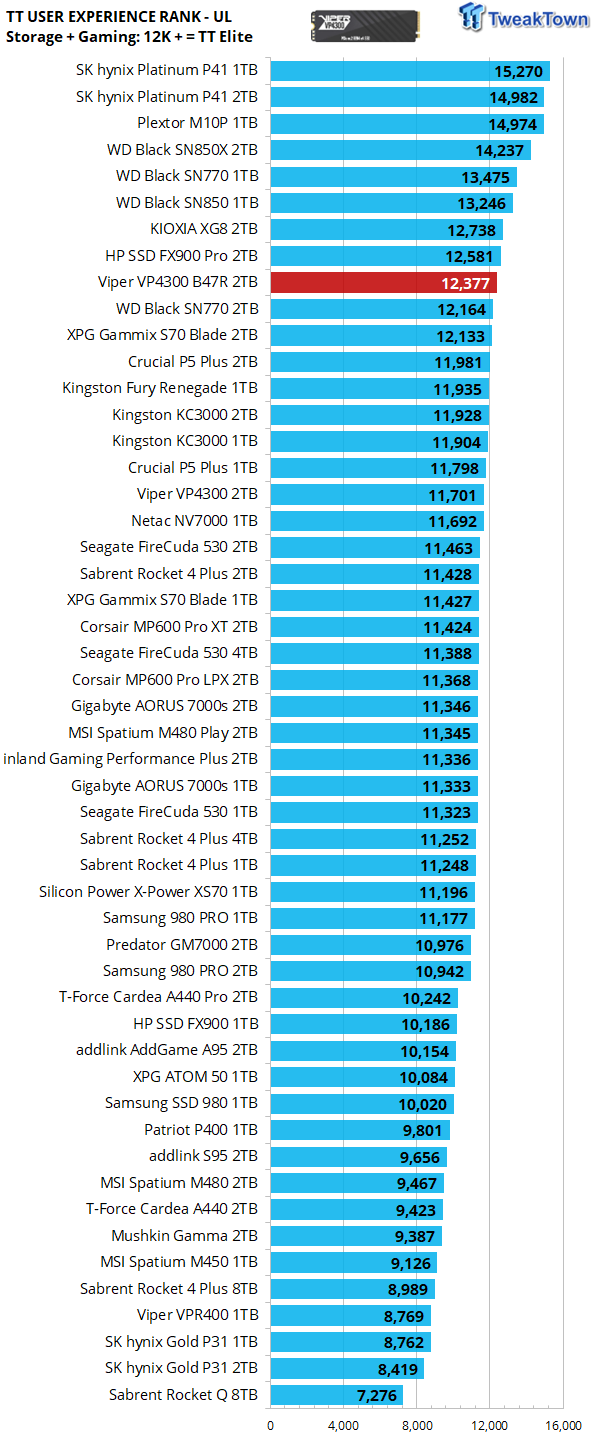
We rank SSDs in terms of overall user experience (performance where it matters most) as expressed by PCMark 10 storage and 3DMark gaming storage tests. We consider a user experience score of 12K or more to verify an SSD as a TweakTown Elite performer. Note we've changed the required score from 11K to 12K to qualify as a TweakTown Elite performer.
Only 11 SSDs on our chart of 51 now make the cut, and the newly configured VP4300 2TB is one of them, placing as the ninth-best performing flash-based we've tested to date. Impressive.
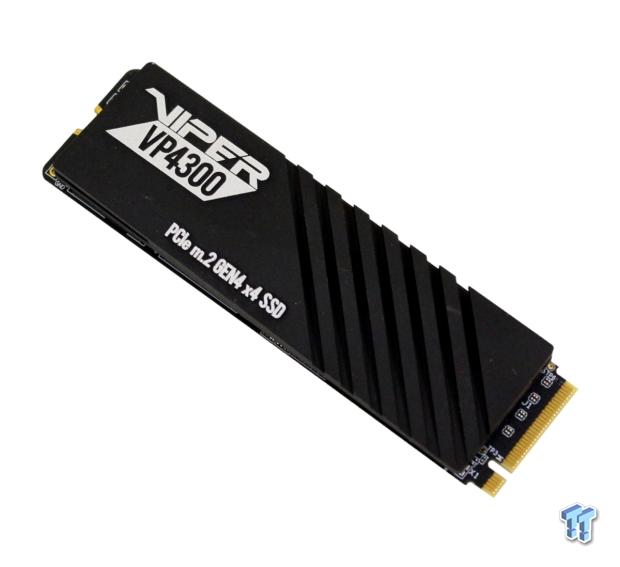
Included optional heat sink as it should be, perfect for PS5, as fast as they come, and bargain pricing has earned the Viper VP4300 2TB our highest award and, more importantly, its stripes as one of the new TweakTown Elite.

